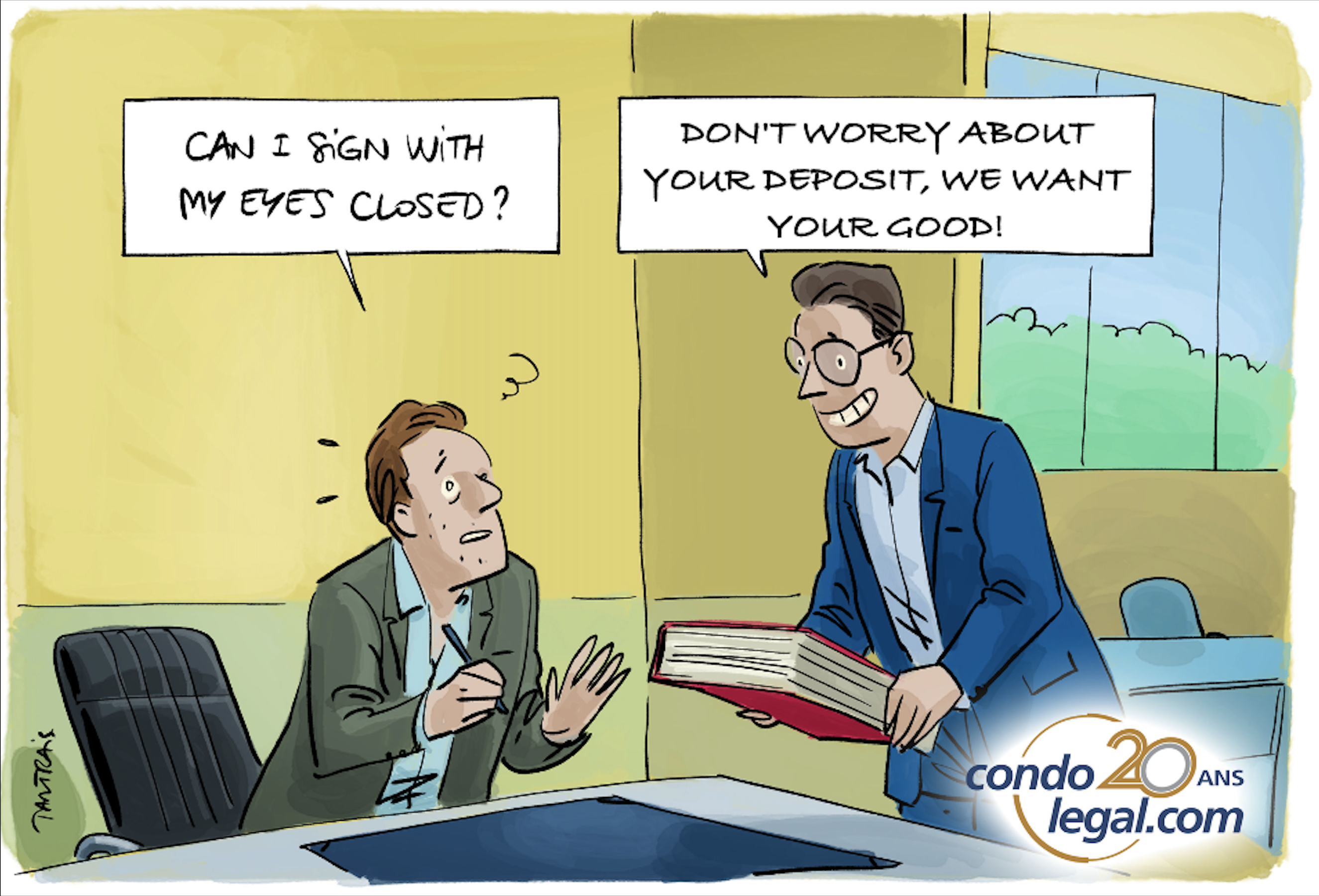 At the time of concluding the offer to purchase, it is customary for the promising buyer to pay a deposit or security deposit of a variable amount. The amount thus paid will be deducted from the amount to be paid if the sale is concluded and will be remitted to the seller. Although a buyer is not legally required to pay a deposit, this practice offers the seller an additional guarantee as to his true intention to buy and his apparent solvency. All in all, this financial effort provided by the buyer is intended to dissuade him from abandoning his project in an irregular manner.
At the time of concluding the offer to purchase, it is customary for the promising buyer to pay a deposit or security deposit of a variable amount. The amount thus paid will be deducted from the amount to be paid if the sale is concluded and will be remitted to the seller. Although a buyer is not legally required to pay a deposit, this practice offers the seller an additional guarantee as to his true intention to buy and his apparent solvency. All in all, this financial effort provided by the buyer is intended to dissuade him from abandoning his project in an irregular manner.
What is a deposit?
The Civil Code of Quebec provides that “any amount paid on the occasion of a promise of sale is presumed to be a deposit on account of the price, unless otherwise stipulated in the contract”. The deposit represents the first amount paid by the purchaser to the vendor, to be ultimately deducted from the sale’s price of the apartment. Therefore, it is portion of the sale’s price and it implies the firm commitment of both parties. For the purchaser, it shows his intent to purchase and for the vendor, the intent to deliver the immovable.
The payment of deposits before the execution of the deed of sale
The deposit must not be paid directly to the seller. It could be difficult to recover it if, for one reason or another, the transaction fails. It is recommended to pay this deposit by electronic transfer, certified check or bank draft made out in the name of the buyer's notary or a real estate agency, in trust. Either will deposit this cheque into their trust account upon acceptance of the offer by the seller and will keep the deposit until the deed of sale is published in such a way as to ensure the protection of the buyer's rights. It is the safest place to deposit the amounts paid out as a deposit. In general, the forms of the Organisme d'autoréglementation du courtage immobilier du Québec (OACIQ) indicate in the fiduciary clause that the deposit is given when the promise to purchase is drafted and that it will be deposited in the trust account upon acceptance. However, it will also be possible to file it as soon as all the conditions of the offer to purchase have been satisfied, provided that the fiduciary clause is drafted as such.
Refund of the deposits
Theoretically, any deposit paid out should be refunded if the deed of sale is not signed for a reason attributable to the fault of the vendor or if purchaser has exercised its withdrawal rights in the delay specified in the offer to purchase. However, what if a dispute arises between the parties on why the sale has not closed or is annulled? The real-estate broker is often incapable of determining who should keep the deposit, the vendor or the purchaser? Should he refuse to refund the deposit to the purchaser if the vendor contests?
The solutions are different according to what has been negotiated between the parties in the offer to purchase. In some cases, the parties must ask the court to determine their rights. In such cases, the broker will keep the deposit until a final judgment is rendered.
 WHAT YOU SHOULD KNOW! If you present an offer to purchase through a real-estate broker, it is preferable to entrust your deposit with him. A section is provided for this purpose in the form entitled Promise to purchase, made available by the “Organisme d’autoréglementation du courtage immobilier du Québec (OACIQ)”, the body responsible to oversee real-estate brokerage in Quebec.
WHAT YOU SHOULD KNOW! If you present an offer to purchase through a real-estate broker, it is preferable to entrust your deposit with him. A section is provided for this purpose in the form entitled Promise to purchase, made available by the “Organisme d’autoréglementation du courtage immobilier du Québec (OACIQ)”, the body responsible to oversee real-estate brokerage in Quebec.
 WHAT TO KEEP IN MIND: Upon the signing of the sale, the amounts of the deposits paid out are applied in reduction of the sale’s price. If the offer to purchase is declined or aborts, any deposit should necessarily be refunded.
WHAT TO KEEP IN MIND: Upon the signing of the sale, the amounts of the deposits paid out are applied in reduction of the sale’s price. If the offer to purchase is declined or aborts, any deposit should necessarily be refunded.
 WARNING! Do not give a single cent of down payment before your final commitment. Some contracts provide that if the purchaser backs out of the sale, the amount of the deposit will be kept by the vendor. Ask for a receipt, more particularly if you have paid in cash.
WARNING! Do not give a single cent of down payment before your final commitment. Some contracts provide that if the purchaser backs out of the sale, the amount of the deposit will be kept by the vendor. Ask for a receipt, more particularly if you have paid in cash.
Return to the super factsheet Offer to Purchase

